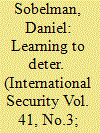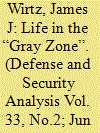| Srl | Item |
| 1 |
ID:
144369


|
|
|
|
|
| Summary/Abstract |
Why do local officials in China often fail to comply with directives of the central leadership in Beijing? Existing scholarship suggests that local defiance results from reform-era decentralization, or from the difficulty of managing agents in a complicated policy environment. In contrast, we conceptualize threats by Beijing to punish local officials as deterrence signals, and analyze local officials’ reactions to these signals as a dynamic process in which they consider the selectiveness, severity and retractability of sanctions, and the reputation of the center, when deciding to defy. Examining the case of Beijing’s application of the seemingly powerful “hold-to-account” practice to curtail investment in iron and steel in 2004, its punishment of local officials in the “Tieben Incident”, and the continued defiance of other local officials, we analyze the dynamics of central–local relations that lead to the failure of the center’s deterrence efforts.
|
|
|
|
|
|
|
|
|
|
|
|
|
|
|
|
| 2 |
ID:
151075


|
|
|
|
|
| Summary/Abstract |
What are the sources of deterrence stability and under what conditions can weak actors deter stronger adversaries? To deter a superior adversary, the weak actor must convince it that if conflict breaks out, the weak actor would be capable of rendering its opponent's strategic capabilities tactical and its own tactical capabilities strategic. The deterrence relationship that has evolved between Israel and the Lebanese Hezbollah in the decade since—and as a result of—the 2006 Lebanon War (a.k.a. the Second Lebanon War or the July War) confirms this observation. A comparison of these two actors’ deterrence behavior in the years preceding the war and in its aftermath shows that one of the leading explanations for the ongoing stability along the Israeli-Lebanese border is that Israel and Hezbollah have learned to apply deterrence in a manner that meets the prerequisites of rational deterrence theory.
|
|
|
|
|
|
|
|
|
|
|
|
|
|
|
|
| 3 |
ID:
154332


|
|
|
|
|
| Summary/Abstract |
The term “Gray Zone” is gaining in popularity as a way of describing contemporary security challenges. This article describes the “short-of-war” strategies – the fait accompli, proxy warfare, and the exploitation of ambiguous deterrence situations, i.e. “salami tactics” – that are captured by the term and offers several explanations for why state and non-state actors are drawn to these strategies. The analysis highlights why defense postures based on deterrence are especially vulnerable to the short-of-war strategies that populate the “Gray Zone.” The article concludes by suggesting how defense officials might adapt defense policies to life in the “Gray Zone.”
|
|
|
|
|
|
|
|
|
|
|
|
|
|
|
|
| 4 |
ID:
189875


|
|
|
|
|
| Summary/Abstract |
This article introduces the ‘deterrence failure’ concept and applies it to North Korea’s nuclear threat situation. For this purpose, it selects five factors, including retaliation posture; credibility of retaliation; probability of the challenger’s success; challenger’s irrational leader; and situational desperateness, to evaluate the US–South Korea nuclear deterrence posture against North Korea. Except for the retaliation posture, most factors are very concerning. Therefore, to strengthen their deterrence posture against North Korea, the United States and South Korea should take a few practical measures to ensure the implementation of the US extended deterrence, including the forward-deployment of more US retaliation assets around the Korean Peninsula.
|
|
|
|
|
|
|
|
|
|
|
|
|
|
|
|